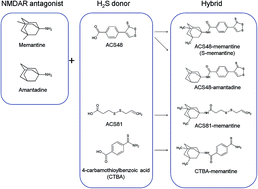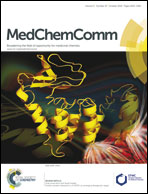Cytoprotective effects of hydrogen sulfide-releasing N-methyl-d-aspartate receptor antagonists mediated by intracellular sulfane sulfur†
Abstract
Hydrogen sulfide (H2S) exerts a host of biological effects ranging from cytotoxicity to cytoprotection. Cytotoxicity of H2S in neurodegenerative diseases may be mediated by N-methyl-D-aspartate receptor (NMDAR) activation. To exploit cytoprotective effects of H2S while minimizing its toxicity, we synthesized a series of H2S-releasing NMDAR antagonists and examined their effects against 1-methyl-4-phenylpyridinium (MPP+)-induced cell death, a cellular model of Parkinson's disease. We observed that cytoprotective effects of H2S-releasing NMDAR antagonists correlated with their ability to increase intracellular sulfane sulfur, but not H2S, levels. These studies suggest that H2S-donor compounds that increase intracellular sulfane sulfur levels are potentially useful neuroprotective agents against neurodegenerative diseases.


 Please wait while we load your content...
Please wait while we load your content...